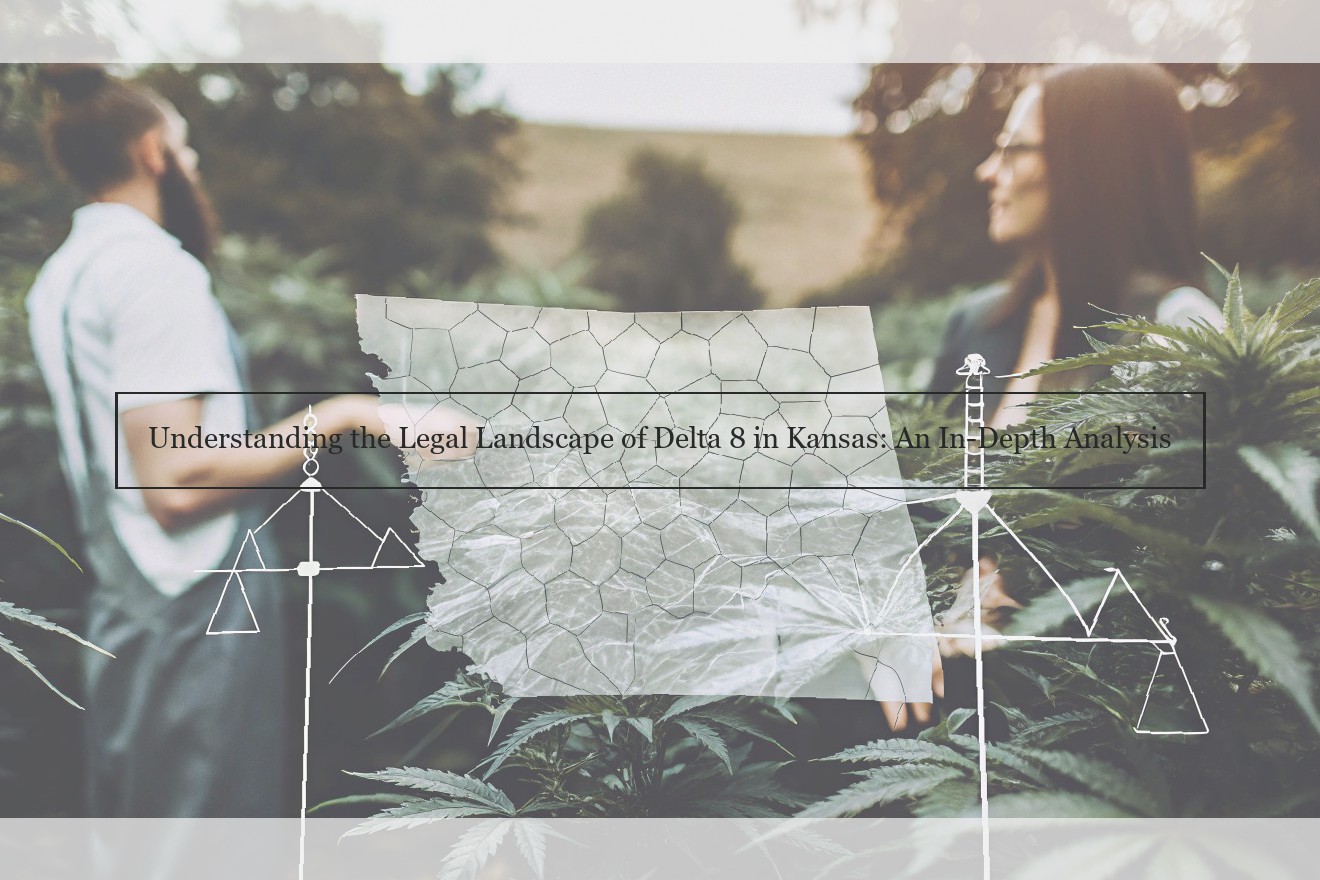The Legal Standing of Delta 8 in Kansas Today
For those who are not up to speed on Kansas state law (I was not until recently), this is what I have found. There are two laws that are central to understanding the legality of Delta 8 in Kansas. The first is a Kansas definition of hemp, which provides as follows: "’Hemp’ means the plant Cannabis sativa L. and any part of that plant, whether growing or not, including the seeds therefor and all derivatives, extracts, cannabinoids, isomers, acids, salts, and salts of isomers, whether growing or not, with a delta-9 tetrahydrocannabinol concentration of not more than three-tenths percent (0.3%) on a dry weight basis." (K.S.A. § 65-410) The second law is the recently passed Farm Bill amendment, 2018 Farm Bill, which decriminalizes the cultivation and manufacture of "hemp," which is defined similarly to the Kansas law below. The currently relevant 2018 Farm Bill amendment to the CSA provides for the following: (2) SEC. 297A. DEFINITION OF HEMP. In this subtitle the term ‘hemp’ means the plant Cannabis sativa L. and any part of that plant, including the seeds thereof and all derivatives, extracts, cannabinoids, isomers, acids, salts, and salts of isomers, whether growing or not, with a delta-9 tetrahydrocannabinol concentration of not more than 0.3 percent on a dry weight basis. (e) Tetrahydrocannabinols Not Regulated- No person shall be subject to arrest , prosecution or penalty under Federal or State law for conduct relating to industrial hemp (as defined in section 297A of the Agricultural Marketing Act of 1946 (7 U.S.C. 1639O)) or products containing hemp." The interplay of the two statutes indicates that marijuana containing be more than 0.3% delta-9 THC is illegal. However, the 2018 Farm Bill amendment to the CSA indicates otherwise, possibly due to the focus on the delta-9 compound rather than applied to tetrahydrocannabinols, as a general compound class. In 2021, the Kansas Supreme Court ruled, retroactive to 2018, that hemp and cannabinoids were no longer classified as a controlled substance in the state of Kansas in "a case in which an employee was fired for having tested positive for marijuana in the workplace." The court stated that "the Farm Bill legalized hemp and thus legalized THC found in hemp." In September of 2022, the Kansas Department of Agriculture issued a statement explaining that Delta 8 "is not a naturally occurring compound, nor can it be obtained from any part of the cannabis plant. It is instead a synthetic compound." Because Delta 8 is a THC compound, we believe that since marijuana containing greater than 0.3% delta-9 THC is illegal under Kansas state law, derived delta-8 should also be illegal. We believe that the Kansas Department of Agriculture’s statement is of dubious legal strength. The Department has no apparant self-proclaimed legal authority in Kansas, as it does not appear to be established in law. The statement also scrupulously avoided discussion of the Farm Bill amendment’s impact on Delta 8’s legality within the state. More to come…
The Differences Between Delta 8 and Delta 9
In order to understand the legal status of Delta 8 THC in Kansas, it’s essential to differentiate it from its more well-known cousin, Delta 9 THC. While both fall under the category of natural cannabinoids found in the cannabis plant, their chemical structures differ significantly in terms of legality and psychoactive effects.
At the molecular level, Delta 9 THC features a double bond on the ninth carbon bond, while Delta 8 THC has a double bond on the eighth carbon bond. This seemingly minor shift in the location of the double bond alters the way both THC compounds interact with the body’s endocannabinoid system, affecting its psychoactive properties. Delta 9 is known for its more intense and euphoric psychoactive effects, while Delta 8 is reputed to produce a more mild, mellow high, without the paranoia often associated with high-THC cannabis products.
Despite the similar molecular structures, these two compounds have different legal statuses. The main reason for this difference can be traced back to the "Farm Bill", which is a federal law enacted in 2018 that legalized the production and sale of hemp-derived products across the nation, as long as they contain 0.3% or less Delta 9 THC. This law makes no mention of Delta 8 THC. As a result, manufacturers have been able to create high-CBD products infused with intoxicating levels of Delta 8 THC, which has created legal gray area that varies state by state with regard to the purchase, possession and use of Delta 8 THC.
State vs. Federal Laws: What You Should Know
At the federal level, the 2018 Farm Bill legalized hemp, defined as the cannabis plant and any part of the plant, including its derivatives, extracts, cannabinoids, whether growing or not, with a delta-9 THC concentration of no more than 0.3 percent on a dry weight basis. It is important to note that THC is considered a tetrahydrocannabinol, regardless of structure. While the 2018 Farm Bill includes the term "hemp" in its definition of the term "marihuana," the DEA has placed delta-8-THC within the tetrahydrocannabinols classification. Because 8-THC is a compound of legally grown hemp, some state regulators have had difficulty discerning how exactly to classify it, creating an enforcement gap.
In practical terms, these state-based decisions mean that, as a matter of federal law, products made from industrial hemp extracts, including delta 8-THC extracts, are not illegal. This means that there may be no federal repercussion in the manufacture or sale of delta 8-THC products in Kansas. Federal regulations generally defer to state laws over marijuana and cannabinoids.
Consumer Rights and Responsibilities in Kansas
Consumers in Kansas need to be aware of a few restrictions when purchasing Delta 8 products. First and foremost, the age restriction is 21. For all intents and purposes, this means that you must be at least 21 years old to purchase any type of Delta 8 THC product or cannabis product in general. This follows the same guideline that liquor, or any other controlled substance, must be purchased by a person 21 years of age or older. Now, there are exceptions to this restriction, such as when you’re in a household or providing for a minor child. But if you are looking to purchase a cannabis product for yourself, you must be at least 21 years old.
There is also a requirement that a cannabis product sold in Kansas, including Delta 8 THC products, must be labeled with the following information: the ingredients, where the cannabis or hemp was cultivated in the state, and whether or not that cannabis product has been tested in a lab for contaminants. It’s important to note that consumers looking to purchase Delta 8 products in Kansas should look for packaging that complies with this labeling requirement. If it does not , it may be best to refrain from purchasing until proper labeling is provided. As a general tip, you should always look at the ingredient label of a product before you purchase it.
In terms of where you can actually purchase Delta 8 products in Kansas, you must do so from a "qualified" entity. And while that might be difficult to define and map out, it essentially means that the seller has been approved by the state. Most likely, you will know an entity is qualified by its signage, as there should be a state-regulated shield on display. Additionally, that entity is required to be registered with the state on a public registry. As such, consumers might want to look up the state registry before purchasing a Delta 8 THC product from a specific seller, to make sure that seller has been approved by the state, and that their license and permit are in good standing.
The Future of Delta 8 in the Sunflower State
With public attitudes towards cannabis steadily evolving and the success of the 2018 Farm Bill, which fully legalized hemp at the federal level on a range of uses, the future may look bright for companies and consumers of Delta 8 in Kansas. While there are always exceptions, the majority of people are not adverse to cannabis for either medical or recreational purposes. The administration of Delta 8 mirrors in many ways the legalization trends for cannabis in general. Just like some states were slow on the uptake for recognizing the legal legitimacy of the cannabis industry, you will also find some states slow to recognize the legitimacy for the cannabis derivatives industry. Based on recent history, it can be predicted that strength of the cannabis lobby and public opinion will continue to turn the tide in favor of legality of the cannabis derivatives industry. The marijuana legalization battles have shown that states are increasingly willing to implement some form of legalized cannabis whether through the recreational, medicinal, or hemp-based operations . Even the moral panic that often accompanies newly legalized industries that implement unprecedented changes have shown a tendency to be short-lived and quickly implemented within long-standing legal frameworks.
Being an early adopter of the farm bill and the cannabis derivatives industry can carry with it a significant amount of advantages. Such advantages may include the promotion of the cannabis industry as a primary driver of state tax revenues and job growth. In much the same way that California and Colorado have been the bellwether for cannabis legalization, others have followed suit – such as Illinois and New York. At the same time, it is clear that the traditional "bigger is better" politics of Kansas will likely be an obstacle for the cannabis derivatives industry if they are viewed as a threat to the traditional Kansas way of life. A full reversal of position or immediate decrease in the legality of Delta 8 in this state is extremely unlikely, not to mention its broader legalization in other states. If you can ride out the uncertainty of the political atmosphere, you may be rewarded with significantly increased business interests as industry adopts to the new norm.




+ There are no comments
Add yours